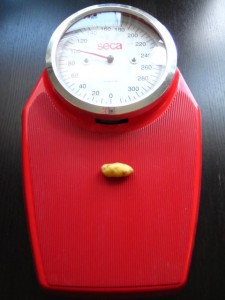 You eat the same foods, do the same things day in and day out, but suddenly your clothes start to fit a little tighter. There is no denying it, you’ve gained weight. You are not alone! As we age, we gain on average about one pound of weight a year. This may not sound like much on its own, but once you add 10-20 years, it can bump you into the overweight/obese category.
You eat the same foods, do the same things day in and day out, but suddenly your clothes start to fit a little tighter. There is no denying it, you’ve gained weight. You are not alone! As we age, we gain on average about one pound of weight a year. This may not sound like much on its own, but once you add 10-20 years, it can bump you into the overweight/obese category.
The reasons for this expanding waistline are as numerous and complex as people are. However, one recent study from Harvard has found that certain foods, such as the potato, may be partly to blame.
The study looked at data from over 120,000 non-obese men and women spanning 20 years. The Harvard researchers found that certain foods caused people to gain more weight than other foods. That is to say, not all foods are created equal. They also found that certain behaviors led to long-term weight gain.
Here is what they found:
Foods that caused steady weight gain over time.
- Potatoes. The #1 culprit. Although french fries and potato chips were extra fattening, even mashed, boiled or baked potatoes resulted in weight gain. The reason is not clear, but other studies have found that starches and refined carbohydrates result in blood sugar and insulin surges, making people feel less satisfied, eventually resulting in overeating.
- Sugar-sweetened beverages. Not the first time you’ve been told to stay away from soft drinks. Other studies have consistently found that soft drinks add extra calories and cause weight gain. If you still drink sodas, now is the time to rethink your drink.
- Unprocessed and processed red meat. Eat red meat in moderation. Other reasons to eat less: red meats are high in saturated fats which raise cholesterol levels, including LDLs, the “bad” cholesterol. Processed meats have been found to cause heart disease and diabetes.
- Sweets, desserts and refined grains. These foods are usually eaten in addition-to a meal and not instead-of, adding extra calories and causing weight gain.
Behaviors that resulted in weight gain:
- Alcohol
- Smoking
- Sleep. Less than 6 hours or more than 8 hrs.
- TV
Foods that resulted in less or no weight gain:
- Fruits and vegetables. Another reason to pile on the greens. Other health benefits include: reduce blood pressure, reduce your risk of heart disease, stroke and some cancers just to name a few.
- Whole Grains. Besides the weight loss benefit, whole grains are full of nutrients and fiber. Whole grains lower cholesterol, lower insulin levels, prevent certain cancers, keep you regular and help you feel full.
- Nuts. Nuts may be high in fat but these fats are the good- mono and polyunsaturated fats. Eating a handful of nuts is better for you than eating a handful of chips. Caveat ,watch the portion sizes.
- Yogurt. This was a surprising finding. Researchers believe it could be the active cultures or probiotics found in yogurt which may change your digestive tract. Whatever the reason if you want to add yogurt to your diet keep it non-,or low-fat.
Behaviors that resulted in weight loss:
- Exercise. Find an exercise you always wanted to try or do something you already like, you will be more likely to stay with it long-term.
Click below to hear Darius Mozaffarian, one of the Harvard researchers, discuss the findings first hand.
Some final comments. Cohort studies like the ones that were analyzed in this study have a few flaws. One major flaw is that such studies can only demonstrate “correlations”, or “relationships” between certain factors, without necessarily demonstrating “causation”. For example, people who ate yogurt didn’t gain as much weight as those people who didn’t eat yogurt. This does not necessarily mean that when you eat yogurt you lose weight but it could simply mean that yogurt eaters are more health conscious in general and that’s why they eat yogurt to begin with.
Despite this flaw, these findings are significant and in general excellent advice. The next time you order a baked potato instead of fries you might want to order a salad instead.
References:
D. Mozaffarian, T. Hao, E.B. Rimm, W.C. Willett, and F.B. Hu. Changes in Diet and Lifestyle and Long-Term Weight Gain in Women and Men. The New England Journal of Medicine. 2011; 364:2392-2404.
Malik VS, Schulze MB, Hu FB. Intake of sugar-sweetened beverages and weight gain: a systematic review. American Journal of Clinical Nutrition. 2006; 84:274-288.
Liese AD, Roach AK, Sparks KC, Marquart L, D’Agostino RB, Jr., Mayer-Davis EJ. Whole-grain intake and insulin sensitivity: the Insulin Resistance Atherosclerosis Study. American Journal of Clinical Nutrition. 2003; 78:965–71.
